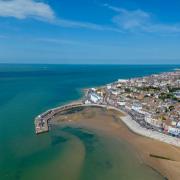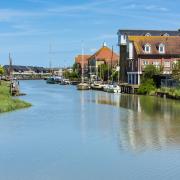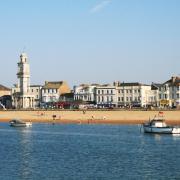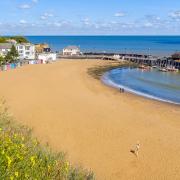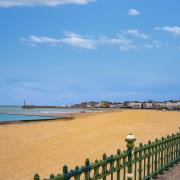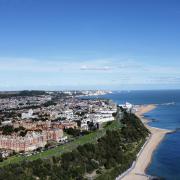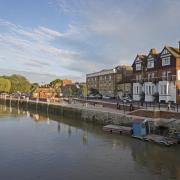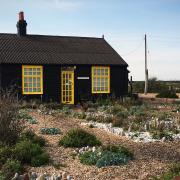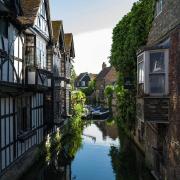Many of Kent’s cafés and coffee shops are taking part in a green revolution - reducing their waste and ditching single-use plastics

For decades we’ve been freely using single-use plastics such as bottles of water and plastic drinking straws. But in recent years has it become obvious that only a small percentage is actually being recycled.
Tonnes of plastic waste are being swept into the seas, washing up on our beaches and entangling wildlife. So-called micro plastics are even being eaten by marine life and ending up in the food chain.
It’s a massive problem on a global scale but it’s something that only recently captured the British public’s imagination.
And that’s almost entirely down to naturalist, revered broadcaster and national treasure, Sir David Attenborough.

Last year he ended his award-winning BBC series Blue Planet II by calling on the world to cut back on its plastics to protect the oceans.
It was the wake-up call many of us needed and the BBC themselves banned single-use plastics in their own buildings not long after.
When it comes to disposable catering items, one of the worst offenders has to be takeaway coffee cups. Although largely made from cardboard, their waterproof plastic coating means they go straight to landfill.
The problem is so big in this country that a levy, similar to that which charges 5p for plastic carrier bags, has been proposed and the committee looking into it for the government has recommended that standard takeaway cups be banned by 2023. In May, Parliament itself banned disposable coffee cups, water bottles, straws and plastic cutlery at Westminster, replacing them all with compostable or reusable alternatives.

There are now dozens of reusable coffee cups on the market, with brands like KeepCup, Stojo, Ecoffee Cup and Pokito leading the way. Some are made from bamboo material, others are recyclable silicone.
They can be used time and time again, potentially saving tonnes of waste. The hope is that it’ll be become the norm to grab your cup from your pocket or handbag and ask to have it filled at coffee shops and cafés.
If you don’t have one yet, many places are also stocking them. One such business is Hamerton + Jones in Goudhurst, which has been selling them since January.
“There were rumblings about the impact of takeaway coffee cups when we opened last year,” says co-owner Kali Hamerton-Stove. “So we did some research and learned that 100 billion cups go into landfill every year. 100 billion!? This simply isn’t sustainable. We hated that our business might be adding to this.

“We did a lot of research into different types of cups and how to offer our customers the best ethical and practical choice.”
Kali opted for Ecoffee Cups. The main part of the cup is made from quick-growing, biodegradable bamboo fibre, with a sleeve and lid made from silicone.
“These cups come in gorgeous colours and designs,” says Kali. “And best of all, they go in the dishwasher and last for years. They are very light – they actually feel a bit like a cardboard cup – so people can throw them in their bag and have them handy when they visit any café.
“We offer a discount if customers bring in a reusable cup; we really want people to make reusable the norm.

Initially customers would forget to bring their cup back in and would get annoyed with themselves but, like shopping bags, they’re forgetting less and less. It’s become a habit to have their cup with them.
“It’s amazing to see this change in behaviour and it’s exciting to be a part of the solution. We’re working hard to play a small role in making the world a better place.”
Meanwhile, there’s a growing scheme called Refill which aims to offer free drinking water to those using their own bottles.
One of the many businesses taking part is the Whitstable Produce Store. “Refill started in Bristol and is now nationwide,” says owner Steve Jones.
“There’s a free app that tells people how close they are to a venue that will refill their water bottle without needing to worry about asking and without making them feel they should buy something. We registered and were one of the first Whitstable businesses to feature on the app.”
Shops and cafés offering a tap water refill station see increased footfall and the scheme is backed by all the UK’s water companies.
It’s like returning to the days of free water fountains and the intention is that soon there will be a place to refill on every street. Participating cafés, bars, restaurants, shops, museums, hotels and other businesses also display the Refill sign in their windows. There were 1,600 stations across the UK at the last count
and the number is growing all the time.
“We got involved because we are interested in recycling and concerned about single-use plastic,” says Steve.
“We want to do as much as we can to help. We have always used china, glass and metal cutlery for people eating in-house and sourced biodegradable packaging for takeaways as far as possible.
“The recent focus on plastic also encouraged us to trial selling reusable coffee cups at the store and this has gone well. People get a free hot drink when they buy a cup. We sold out of our first batch of reusable cups in just a few weeks, which speaks for itself.”
Plastic drinks cups, such as the pint glasses we’re given at outdoor events, are also on the hit list, with alternative compostable brands including Vegware and Biopac.
Plastic drinking straws are set to disappear too, replaced with compostable or reusable alternatives – although many are choosing to eradicate straws altogether.
Vanessa Ferrett, from Lime Wharf Café at Bodiam Boating Station in Newenden, has chosen this option. Her attention was brought to the problem after collecting plastic litter on the beach recently.
“We were so appalled at how much rubbish there was,” she says. “We collected as much as we could carry. Now we say on our menus that we no longer put straws in our drinks.
“And we ask people to encourage their kids not to need them. For small children though, we do have some paper ones.
“We are aware we need to do more. We sell a lot of takeaway food and drinks to those hiring our boats on the river and are not a fan of glass bottles for safety reasons. We are currently in talks with a company selling collapsing reusable coffee cups and hope to see them on our shelves very soon.”
Groups like Plastic Free Deal are popping up across the county too. Aiming to encourage local businesses to ditch the plastic, they are part of an initiative started by Surfers Against Sewage, an environmental organisation who have set up a national accreditation scheme aimed at coastal communities in particular.
“Like many people we were inspired by David Attenborough’s Blue Planet last year and the impact of plastic on the health of our oceans,” says Plastic Free Deal’s Helen Matthews.
“We want to take practical steps to ‘recycle, reuse, refuse’ single-use plastic in the town. The idea is to get businesses, Individuals, community organisations and local authorities to make a pledge to ditch three items of single-use plastic to get the ball rolling.
“There is a lot of good practice in reducing single-use plastic in the town among our local businesses. We want to highlight our ‘plastic-free business stars’ and find many more.”
Earlier this year the group organised a Plastic-Free Week in Deal, with beach cleans, talks on recycling, work in local schools, stalls explaining plastic-free alternatives and a community art workshop.
Just some of the Deal businesses that have jumped on board with the scheme are the Just Reproach micropub (which has dropped plastic straws and started using compostable takeaway glasses), Moveable Feast café (which has gone for compostable drinks cups and stopped selling bottled water) and The Fryer Tuck chip shop (which has replaced polystyrene takeaway containers with biodegradable alternatives).
Seeing themselves as part of the solution rather than part of the problem certainly has a feel-good factor and customers are taking it to heart too, with many actively seeking out businesses with these policies.
“This feels like one issue where we can help and see an outcome,” says Steve from the Whitstable Produce Store.
“Where it’s possible to make a difference through small changes we can make. The next generation will certainly see this as a priority.
“As an example, pupils at a nearby school have recently written to local businesses to ask what we are doing to help and it was good to be able to tell them about the steps we are taking.”
Find out more
Visit www.refill.org.uk to download the Refill app and www.plasticfreedeal.org.uk
10 top tips
1 Think before you buy
Before you start spending, think about your shopping list: avoid buying single-use plastics such as water bottles and invest in a reusable drinks bottle instead. Avoid packaged goods such as fruit and veg and opt for produce from the fresh section.
2 Buy a reusable bag
People still forget to buy reusable bags or take one they’ve bought with them on the next trip to the shops. The best thing to do is buy one and pop it back in the boot of the car once you’ve unpacked the shopping; it’ll be there ready for next time.
3 Avoid microbeads
Microbeads found in face washes, toothpastes and other beauty items are often washed down the sink and end up in our oceans. The tiny size of the beads means they are ingested by marine life and can often end up back on our plates.
4 Buy in bulk
Buying your food in bulk uses less packaging than buying smaller amounts of food more frequently. You can keep food such as cereal in tubs and it will save both the environment and you more money.
5 Cook more
Avoid ready meals and takeaways packaged in plastic and cook from scratch at home. You will not only cut your plastic consumption, but it will save you money and it’s healthier for the family.
6 Avoid wet wipes
Wet wipes and baby wipes are made with plastic resins such as polyester and are responsible for clogging drains when they are flushed down the toilet. The government is in talks about eliminating wipes in the hope that businesses will formulate eco alternatives, so it’s best to get used to living without them now.
7 Avoid plastic in clothing
Synthetic fibres such as polyester and lycra have tiny micro-plastic fibres that come off in the wash and through general wear. Opt for natural fibres such as cotton, linen and wool to prevent this.
8 Use refillable stations
Retailers are starting to provide refillable stations for certain convenience items, so where possible, research your local area for facilities and take your own containers to refill your goods. This means you won’t have all the unnecessary packaging each time you shop.
9 Use naked toiletries
Certain retailers specialise in toiletries with no packaging, such as soap and shampoo bars. Simply lather and place back on the side of the tub for the next use. There’s no packaging
to throw away, as once the toiletries are gone, they’re gone.
10 Say no to straws
Plastic straws are a functionless plastic that are being banned in retailers and restaurants nationwide. If you want to have straws for a birthday party, for example, opt for paper straws that are recyclable.
With thanks to waste and recycling company Junk Hunters, www.junkhunters.co.uk




